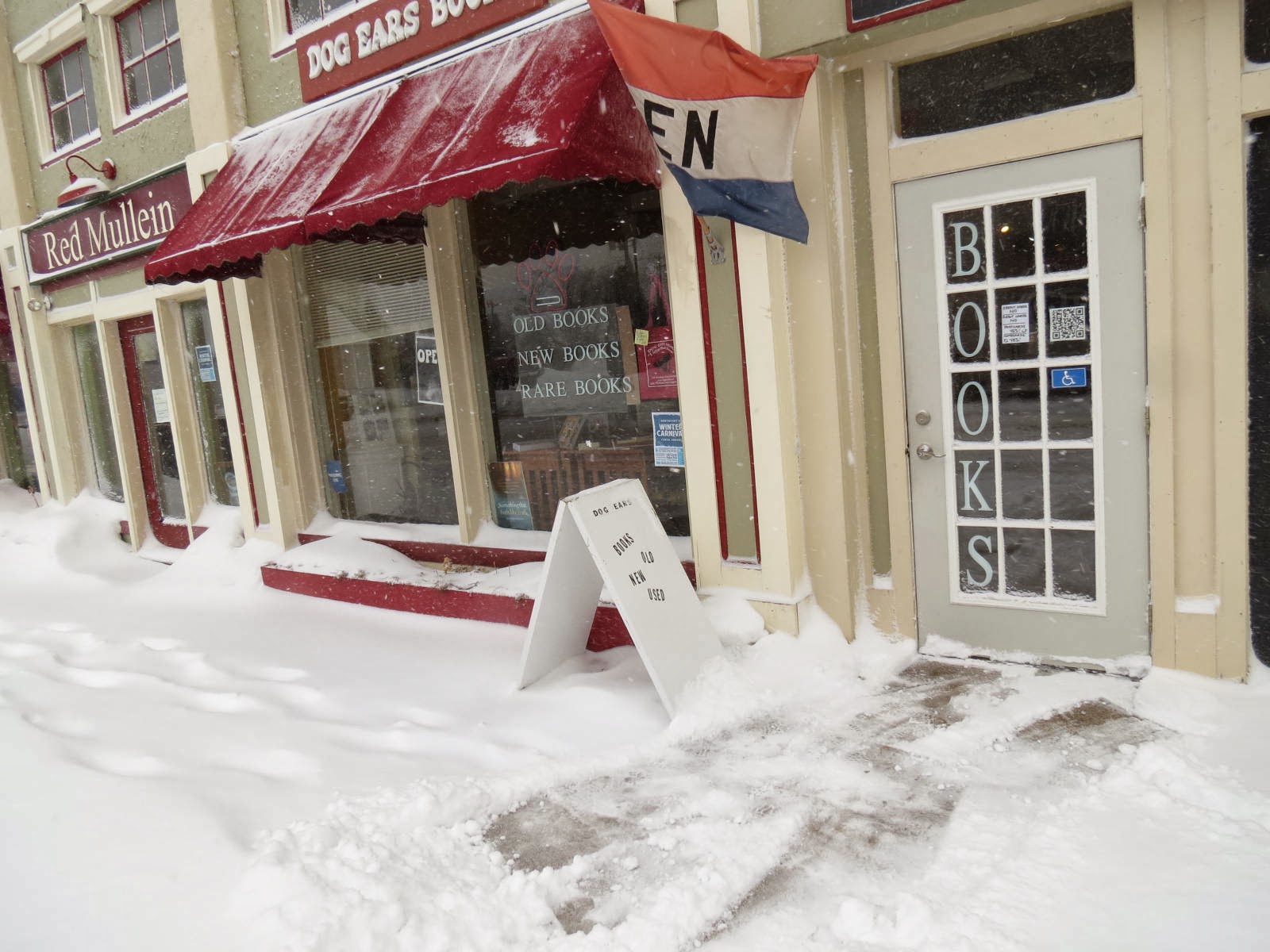 |
| What light through yonder window breaks! |
March – at last! Often
considered the least bearable month Up North, March can bring late winter
storms or early spring blossoms, or it can zig-zag back and forth from one
season to the other. Wise are those who save their “winter” getaway for March,
when desire for change – of scenery, of weather, of company – can just about
blow the top of a person’s head off. What do you say of today? Is
it lion or lamb? Or, taking our cue from William Blake, shall we ask, is it
tiger or lamb? We drove home around midnight last night, after a dinner party, through near-blinding snow, so I'm going to say March came in like a very big cat, neither creeping softly like fog nor frolicking gaily like a spring lamb.
Whatever March brings, the plan is for our pack to stay put and stick it out. On Thursday morning past, we thought we might just stay put at home and
not even venture into the village. The morning had brought more subzero wind
chills, there was more blowing and drifting in the forecast, and all the area
schools were closed. Why bother? On the other hand (see photo above through farmhouse bathroom window), the sun was shining! I mean, the sun was shining!!! And our driveway was plowed clear and not, it seemed,
drifting closed any too fast. We came to town. I opened the bookstore. A customer
called, having gotten my message from yesterday, and said she would be in to
pick up her order, eager to have it. “Good! I’m here!”
And considering that we’ve
endured yet another week of brutally cold weather, with no real let-up in
sight, it wasn’t a bad week for Dog Ears Books. First of all, on Wednesday I
discovered that we’d made the website of the National Writers Series. Cymbre
Foster had contacted me earlier in the month, sending a questionnaire and
requesting photographs, and NWS has always been supportive not only of writers
but also of area bookstores, but the new NWS initiative to feature bookstores
and bookstores on their site has me nearly speechless with gratitude. Nearly, I
said. Thank you, National Writers Series!
Next, remember the mystery
poet? Nothing had come from him or her for quite some time, but Wednesday
brought another poem (this one #7). As usual, it was typed on lined paper, with no return
address or signature, and a variety of old stamps made up the necessary
postage. Thank you, mystery poet!
 Here's a transcription, in case my photograph is too difficult to read: "what of love is the daffodil moon/if not mr. day/to ms. night crooning/I send you flowers but you/never call/and from the window/ms. night leaning/but don't you see I unboxed them all."
Here's a transcription, in case my photograph is too difficult to read: "what of love is the daffodil moon/if not mr. day/to ms. night crooning/I send you flowers but you/never call/and from the window/ms. night leaning/but don't you see I unboxed them all." Don’t you love the thought of daffodils on this bitter-cold first March day Up North? At left and below, to complement the poet's offering, is a visual preview in the form of a couple of photographs from last year.
 |
| April 27, 2013 |
A third surprise came on
Thursday morning when I opened my daily issue of Shelf Awareness and saw
myself heading the page under “Quotation of the Day.” Total surprise! Thank you, Shelf Awareness and Robert
Gray! Thanks for further
elevating my bleak winter mood, already given boosts by Cymbre, NWS, and the
mystery poet.
Yes, I’ve had worse weeks in
my life than the last one of February 2014.
And look at these poor,
patient lovelies.
This group of deer has spent most of the winter yarded up in
a little patch of woods on the western edge of the village of Northport. Like humans (one young mother, indoors for weeks with small children, told me she feels "like a hamster on a wheel") and dogs (thank heaven Sarah had one indoor play date this week!), local deer have been treading and retreading the same limited ground
for the past couple of months. There’s no way they’ll be flying to Florida, and
they don’t even have the relief of escaping through books or movies, but do
they complain?
Here Up North, do we humans
complain? Yes, indeed. This year, just about all of us. But February is past, March is here,
and sooner or later we’ll see daffodils -- and be able to walk and run and explore in the woods again, too, Sarah. I promise! Just be patient a little longer....
P.S. If the date on this post appears as February 26, that's because I began composing and saving it on that day, and it was just too much trouble to copy the whole thing over again to make the date come out as March 1. Trust me! It is Saturday, and I'm really looking out to a sunny Waukazoo Street on the first day of March as I click on -- any moment now -- "Publish." There!


























